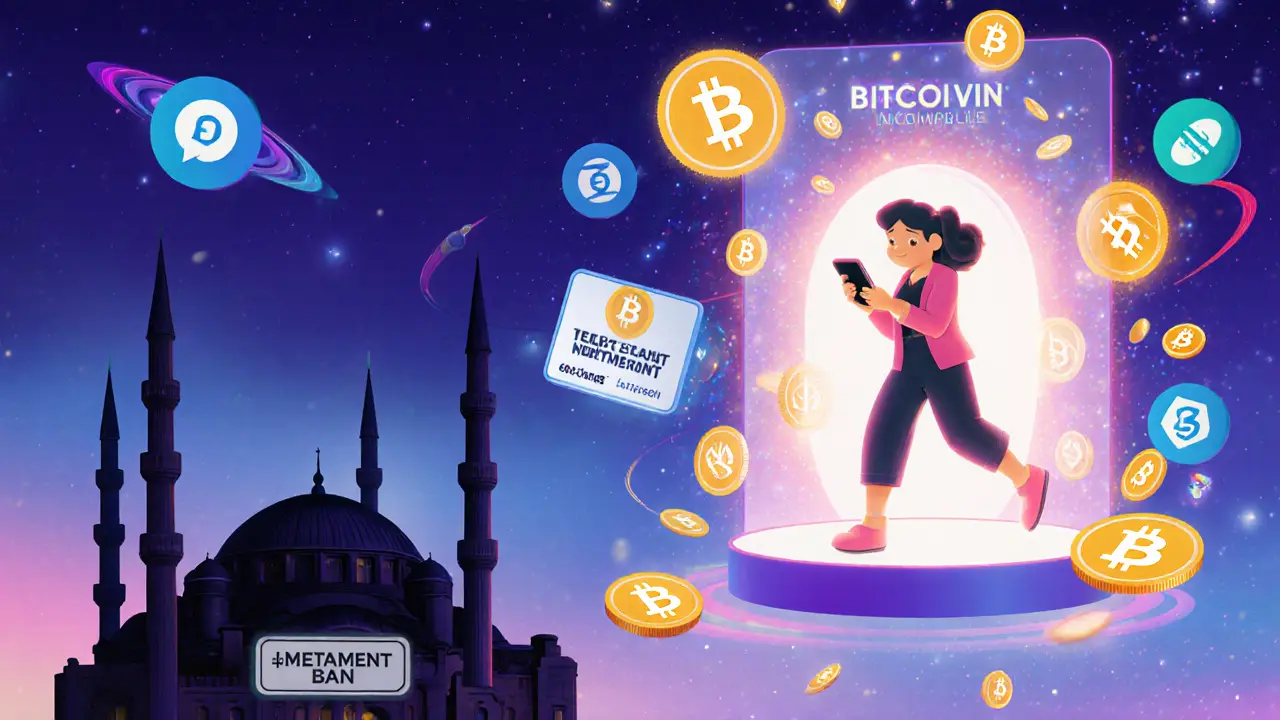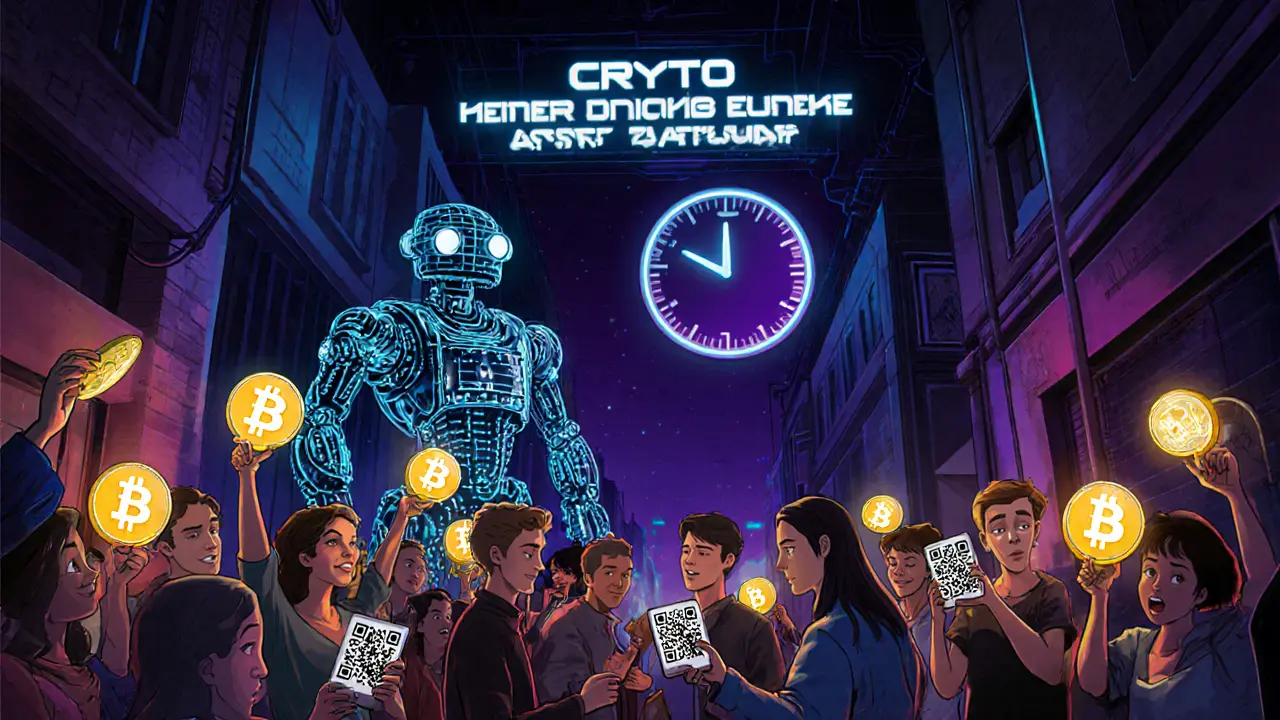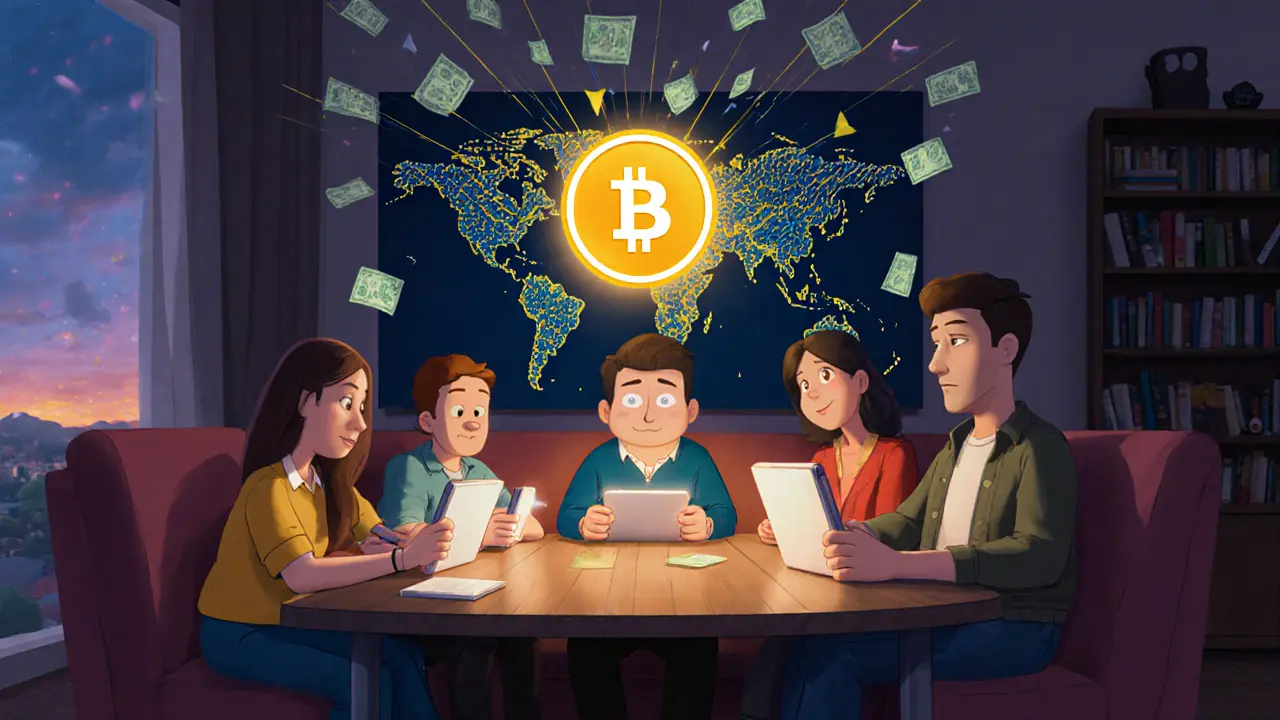Lira to Stablecoin Value Calculator
Preserve Your Savings from Inflation
The Turkish lira has lost 70%+ of its value since 2020. Learn how stablecoins like USDT can protect your savings from inflation while crypto payments remain restricted in Turkey.
Your Savings Today
Results
Enter your values above to see how inflation affects your savings
Based on 2023-2025 Turkish inflation rates (43%+ annually)
When Turkey banned cryptocurrency payments in April 2021, many assumed the market would collapse. Instead, it exploded. Today, nearly one in two Turkish adults holds or trades crypto-even though you can’t use it to buy coffee, pay rent, or order food online. The government didn’t ban owning crypto. It banned using it as money. And that loophole became the foundation for one of the world’s most creative, resilient, and underground financial ecosystems.
Why the Ban Didn’t Stop Crypto
The Central Bank of Turkey didn’t outlaw crypto. It outlawed its use as a payment method. That’s a critical difference. You can still buy, sell, and hold Bitcoin, Ethereum, or USDT. You just can’t swipe your crypto wallet at a grocery store. The official reason? Protecting consumers from wild price swings and unregulated platforms. But the real effect? It forced people to get smarter. Instead of quitting, Turks adapted. By 2024, the country had 19.5 million crypto users-45% of all adults. That’s more than the entire population of Sweden. Transaction volume hit $85.3 billion in 2024, up 21% from the year before. Turkey now ranks 7th globally in crypto adoption, ahead of Germany and Canada. The ban didn’t kill crypto. It turned it into a survival tool.The Two Worlds of Turkish Crypto
There are now two separate crypto markets in Turkey. One is legal, regulated, and monitored. The other is unregulated, decentralized, and invisible to authorities. The legal side runs through licensed exchanges like Paribu, Binance Turkey, and Bitlo. These platforms follow strict rules: you must verify your identity, transactions over 15,000 Turkish lira (about $425) are tracked, and all activity reports go to the Capital Markets Board (CMB). These exchanges charge low fees-0.05% to 0.25%-and offer fast withdrawals in Turkish lira. But they come with limits. If you try to move more than 15,000 TL in a month, you get flagged. Many users respond by splitting their trades across multiple accounts-sometimes even family members’-to stay under the radar. The other side? That’s where things get interesting. P2P trading has exploded. Platforms like LocalBitcoins saw a 217% jump in Turkish users between late 2021 and late 2024. Monthly volume now hits $1.2 billion. Users meet in Telegram groups, WhatsApp chats, or even in-person cash trades. No ID needed. No limits. Just direct buyer-seller deals. Fees? Higher-0.5% to 2%-but worth it for anonymity. Then there’s DeFi. Even after Turkey banned 63 platforms-including PancakeSwap and Uniswap-in early 2025, users didn’t stop. They just switched wallets. Instead of using Turkish-based apps, they connect MetaMask or Trust Wallet to non-Turkish blockchain nodes. A 2025 study found 3.7 million Turkish crypto addresses interacted with decentralized protocols. That’s not a glitch. That’s a system.How People Bypass the Rules-Technically
You don’t need to be a hacker to get around the ban. You just need to know a few tricks. Most users start with a VPN. A 2024 study by TÜBİTAK found 68% of Turkish crypto traders use a virtual private network to access global exchanges like Kraken or Coinbase. These platforms aren’t blocked by law-they’re just not licensed. So users connect through a server in Germany or the U.S., buy crypto, then transfer it to a local wallet. For DeFi access, it’s even simpler. You install a wallet like MetaMask, then change the network settings to point to a non-Turkish RPC endpoint. That’s a fancy way of saying you trick your wallet into thinking you’re in another country. Suddenly, you can trade on Uniswap, swap tokens on SushiSwap, or lend on Aave-all without the Turkish government seeing a thing. Open-source tools have popped up to make this easier. One project on GitHub called “TurkWallet” automates splitting transactions across multiple wallets so users never hit the 15,000 TL reporting threshold. It’s been starred over 4,000 times and has 87 contributors. It’s not illegal. It’s just… efficient.
Who’s Doing This-and Why
Crypto isn’t just for tech nerds in Istanbul. It’s for teachers, taxi drivers, small shop owners, and factory workers. The average user is between 25 and 44. Urban areas like Istanbul have 42% crypto adoption. Rural areas? Just 18%. That gap tells you something: crypto isn’t a luxury. It’s a hedge. The Turkish lira has lost more than 70% of its value against the dollar since 2020. Inflation hit 85% in 2023. People aren’t buying Bitcoin because they believe in decentralization. They’re buying it because their savings are evaporating. Stablecoins like USDT are the real stars-38.7% of all crypto transactions in Turkey involve them. They’re digital dollars that don’t crash when the lira does. A Reddit user from Ankara posted in April 2025: “I make 25,000 TL a month. My rent is 18,000 TL. If I keep it in lira, I lose 5% a month. If I convert half to USDT, I break even. That’s not investing. That’s not gambling. That’s basic math.”The Risks Are Real
This system isn’t perfect. There are real dangers. The Financial Crimes Investigation Board (MASAK) has frozen thousands of accounts for “suspicious activity.” If you move too much too fast-even if you’re just splitting transactions-you could get locked out for weeks. One user told a local forum his account was frozen for 23 days after transferring 14,900 TL three times in a week. He had to file paperwork, prove his income, and wait. P2P trading carries its own risks. Scams are common. Someone might send you lira via bank transfer, then disappear after you send them Bitcoin. There’s no chargeback. No customer service. Just trust. And then there’s the legal gray zone. Using a VPN to access banned platforms isn’t illegal-but it’s not protected either. If a platform gets shut down, you lose your funds. No recourse. No insurance. No legal backup.What’s Next?
The government isn’t backing down. In May 2025, they added 17 more platforms to the banned list. By June, they announced plans for a “Crypto Asset Gateway” by mid-2026-a centralized system that would control all on- and off-ramps between banks and crypto exchanges. It sounds like a way to bring order. But many experts think it’ll just push more people underground. Dr. Hasan Yılmaz, an economist at Istanbul Finance Center, put it bluntly: “As long as the lira keeps falling and the payment ban stays, people will find a way. The market moves faster than the rules.” The World Bank predicts Turkish crypto volume will hit $102 billion in 2025. That’s not because the ban failed. It’s because the people found a way to make it irrelevant.
How to Get Started (If You’re in Turkey)
If you’re in Turkey and want to trade crypto legally:- Choose a licensed exchange: Paribu, Binance Turkey, or Bitlo.
- Complete KYC: Upload your ID and take a selfie. Takes 15-45 minutes.
- Deposit Turkish lira: Use bank transfer or mobile payment apps.
- Buy crypto: Stick to BTC, ETH, or USDT to avoid volatility.
- Stay under 15,000 TL per month if you want to avoid scrutiny.
- Download a VPN: NordVPN, ExpressVPN, or ProtonVPN work reliably.
- Install MetaMask or Trust Wallet.
- Connect to a non-Turkish RPC (like Ethereum’s mainnet via Infura).
- Use LocalBitcoins or Telegram P2P groups to buy/sell lira for crypto.
- Never send money to strangers without a verified trade history.
What the Experts Say
Dr. Ayşenur Acar, a financial regulation professor at Ankara University, calls it a “paradox”: “Turkey has one of the most active crypto markets in the world-and yet, it’s one of the most restricted. The ban didn’t stop adoption. It forced innovation.” The IMF’s Nathalia Bertini sees Turkey as a global case study: “When you ban a tool but not the need behind it, people invent new tools. That’s not defiance. That’s adaptation.” But the Central Bank warns of risks. FATF’s 2024 report says 43% of Turkish crypto transactions happen in channels too shadowy for anti-money laundering checks. That’s a red flag for global regulators.Final Thought
The Turkish crypto story isn’t about rebellion. It’s about necessity. When your currency is crumbling, you don’t wait for permission to protect your money. You find a way. The ban didn’t stop crypto. It turned every trader into a problem-solver, every wallet into a lifeline, and every transaction into a quiet act of economic self-defense.Is it legal to trade crypto in Turkey?
Yes, buying, selling, and holding cryptocurrency is legal in Turkey. What’s banned is using it to pay for goods or services. The government allows trading on licensed exchanges but prohibits crypto payments to protect consumers and the financial system.
Can I use Binance in Turkey?
Yes, Binance Turkey operates as a licensed exchange under the Capital Markets Board. It requires full KYC verification and follows local rules, including transaction reporting for amounts over 15,000 Turkish lira. You can trade and withdraw lira, but you can’t use it to pay for products.
Why do Turkish people use USDT so much?
USDT (Tether) is a stablecoin pegged to the U.S. dollar. With the Turkish lira losing value rapidly-over 70% since 2020-people use USDT to preserve savings. It’s not for speculation; it’s for survival. Over 38% of all crypto transactions in Turkey involve USDT.
Are P2P crypto trades safe in Turkey?
They’re risky. P2P trades happen outside regulated systems, so there’s no protection if someone scams you. Always use platforms with escrow, check trade history, and avoid large first-time deals. Telegram groups are popular but unverified-trust only those with long, consistent reputations.
What happens if I exceed the 15,000 TL transaction limit?
Your transaction will be flagged by the exchange and reported to MASAK (Financial Crimes Investigation Board). You may be asked to prove the source of your funds. If you’re found legitimate, nothing happens. If you can’t prove it, your account could be frozen for up to 30 days. Many users split transactions to avoid this.
Can I use a VPN to access banned crypto platforms?
Yes, many Turks use VPNs to access global exchanges like Kraken or Coinbase. While not illegal, it puts you outside the legal protections of Turkish exchanges. If the platform shuts down or gets hacked, you have no recourse. Use it for access, not for large sums.
Is crypto trading in Turkey taxed?
As of 2025, there is no specific crypto tax law in Turkey. Profits from trading are not officially taxed, but the government is considering new rules. Always keep records. If regulations change, you’ll need proof of your transactions.

Brian Gillespie
November 12, 2025 AT 10:20Adrian Bailey
November 14, 2025 AT 05:21Ainsley Ross
November 14, 2025 AT 15:54Wayne Dave Arceo
November 15, 2025 AT 22:50Laura Hall
November 17, 2025 AT 06:12Arthur Crone
November 18, 2025 AT 02:36Michael Heitzer
November 19, 2025 AT 19:39Rebecca Saffle
November 20, 2025 AT 23:34Rachel Everson
November 21, 2025 AT 16:55Johanna Lesmayoux lamare
November 21, 2025 AT 21:05ty ty
November 22, 2025 AT 22:13BRYAN CHAGUA
November 24, 2025 AT 20:05Debraj Dutta
November 26, 2025 AT 13:25tom west
November 27, 2025 AT 02:43dhirendra pratap singh
November 27, 2025 AT 09:37Joanne Lee
November 28, 2025 AT 00:11